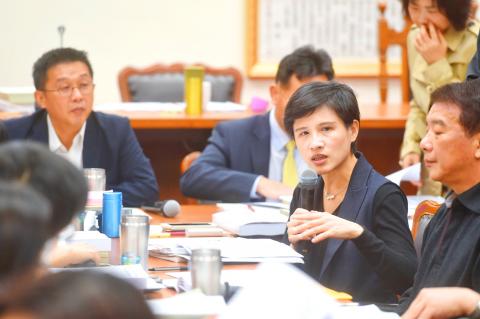Minister of Culture Cheng Li-chiun (鄭麗君) yesterday touted the ministry’s plans to develop ultra-broadband and “revisit historic scenes” as “very forward-looking” in her explanation of its request for NT$21.46 billion (US$711.6 million) in funds earmarked for the Cabinet’s Forward-looking Infrastructure Development Program.
The ministry has submitted subsidy requests of NT$5.66 billion and NT$15.8 billion respectively for its “revisiting historic scenes” and “digital infrastructure construction” projects, Cheng said at a meeting of the legislature’s Education and Culture Committee.
The projects would be carried out from this year to 2020, with some work set to continue until 2021, she said.

Photo: Fang Pin-chao, Taipei Times
“Revisiting historic scenes,” which was listed as an urban and rural construction project under the Cabinet’s plan, would maintain and reinvent historic sites.
It is to incorporate technology into historic sites’ introductions to provide visitors with a better understanding of their historical context, she said.
The project is the first in the nation’s history to incorporate the concept of “cultural governance,” which represents a major step forward, the minister said.
Cultural sites should be added through maintaining and revitalizing existing ones rather than building new ones, which would benefit urban and rural development, Cheng said, adding that future projects proposed by the ministry would be reviewed according to this principle.
The “digital infrastructure construction” project includes plans to develop ultra-broadband services, produce high-resolution television shows, and create TV programs and movies that focus on Taiwanese culture, she said.
The project is to include the establishment of a national cultural database, the creation of TV shows with 4K resolution and the development of over-the-top content — or content distributed online without subscribing to a traditional service — in response to the rise of new media, she said.
Underlining the importance of Taiwanese culture in the broadcasting and film industries, Cheng said that even if bandwidth is upgraded, it would only be “serving other nations’ cultures” if there are no programs that promote Taiwanese culture.

Several Chinese Nationalist Party (KMT) officials including Chairman Eric Chu (朱立倫) are to be summoned for questioning and then transferred to prosecutors for holding an illegal assembly in Taipei last night, the Taipei Police said today. Chu and two others hosted an illegal assembly and are to be requested to explain their actions, the Taipei City Police Department's Zhongzheng (中正) First Precinct said, referring to a protest held after Huang Lu Chin-ju (黃呂錦茹), KMT Taipei's chapter director, and several other KMT staffers were questioned for alleged signature forgery in recall petitions against Democratic Progressive Party (DPP) legislators. Taipei prosecutors had filed

Taiwan would welcome the return of Honduras as a diplomatic ally if its next president decides to make such a move, Minister of Foreign Affairs Lin Chia-lung (林佳龍) said yesterday. “Of course, we would welcome Honduras if they want to restore diplomatic ties with Taiwan after their elections,” Lin said at a meeting of the legislature’s Foreign Affairs and National Defense Committee, when asked to comment on statements made by two of the three Honduran presidential candidates during the presidential campaign in the Central American country. Taiwan is paying close attention to the region as a whole in the wake of a

NEW WORLD: Taiwan is pursuing innovative approaches to international relations through economics, trade and values-based diplomacy, the foreign minister said Taiwan would implement a “three-chain strategy” that promotes democratic values in response to US tariffs, Minister of Foreign Affairs Lin Chia-lung (林佳龍) said. Taiwan would aim to create a “global democratic value chain,” seek to capitalize on its position within the first island chain and promote a “non-red supply chain,” Lin was quoted as saying in the ministry’s written report to the Legislative Yuan submitted ahead of the legislature’s Foreign Affairs and National Defense Committee meeting slated for today. The Ministry would also uphold a spirit of mutual beneficial collaboration, maintaining close communication and consultations with Washington to show that Taiwan-US cooperation

Taiwan and the US have begun trade negotiations over tariffs imposed by US President Donald Trump earlier this month, Minister of Foreign Affairs Lin Chia-lung (林佳龍) said in an interview this morning before reporting to the Legislative Yuan’s Foreign Affairs and National Defense Committee. The Taipei Economic and Cultural Representative Office (TECRO), Taiwan’s de facto embassy in the US, has already established communication channels with the US Department of State and the US Trade Representative (USTR), and is engaging in intensive consultations, he said. Points of negotiation include tariffs, non-tariff trade barriers and issues related to investment, procurement and export controls, he